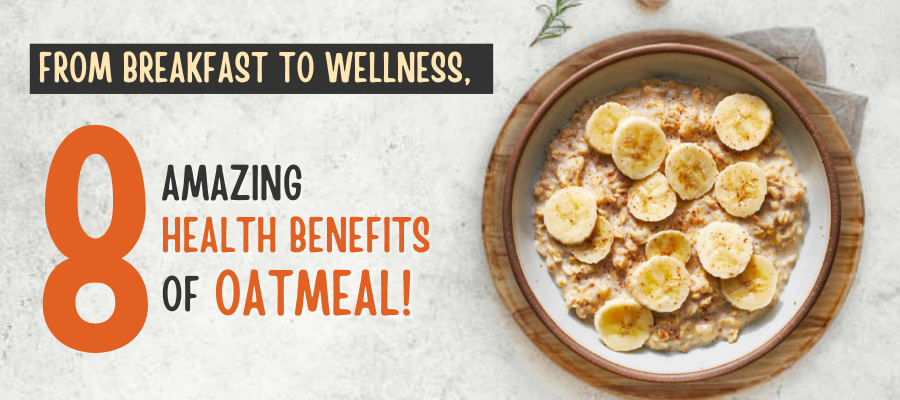तुम्हाला माहित आहे का की ओटचे जाडे भरडे पीठ तुम्ही खाऊ शकता अशा आरोग्यदायी पदार्थांपैकी एक आहे? अत्यावश्यक पोषक तत्वांनी युक्त, ओटचे जाडे भरडे पीठ अनेक आरोग्य फायदे देते जे तुमचे कल्याण मोठ्या प्रमाणात सुधारू शकतात. या ब्लॉगमध्ये, आम्ही ओटचे जाडे भरडे पीठ, त्यातील पौष्टिक सामग्री आणि आपण ते आपल्या आहारात का समाविष्ट करावे याचे अन्वेषण करू.
दलिया म्हणजे काय?
ओटचे जाडे भरडे पीठ हे ओट्सपासून बनवलेले लापशीचे एक प्रकार आहे, जे फायबर, जीवनसत्त्वे आणि खनिजे समृद्ध असलेले संपूर्ण धान्य आहेत. हे सहसा पाण्यात किंवा दुधात ओट्स उकळवून ते मऊ आणि मलईदार होईपर्यंत शिजवले जाते.
ओटचे जाडे भरडे पीठ जगभरात लोकप्रिय नाश्ता पर्याय आहे कारण ते स्वादिष्ट आणि पौष्टिक दोन्ही आहे.
ओटचे जाडे भरडे पीठ पोषण तथ्य
ओटचे जाडे भरडे पीठचे पौष्टिक प्रोफाइल समजून घेतल्यास त्याचे फायदे जाणून घेण्यास मदत होऊ शकते. येथे ओटचे जाडे भरडे पीठ (1 कप शिजवलेले) च्या विशिष्ट सर्व्हिंगसाठी पौष्टिक तथ्ये आहेत:
|
पोषक |
रक्कम |
|
कॅलरीज |
१५४ |
|
कर्बोदके |
27 ग्रॅम |
|
प्रथिने |
6 ग्रॅम |
|
चरबी |
3 ग्रॅम |
|
फायबर |
4 ग्रॅम |
|
साखर |
1 ग्रॅम |
|
लोखंड |
2 मिग्रॅ (10% DV) |
|
मॅग्नेशियम |
56 मिग्रॅ (14% DV) |
|
फॉस्फरस |
180 मिग्रॅ (18% DV) |
|
जस्त |
2 मिग्रॅ (14% DV) |
|
फोलेट |
13 mcg (3% DV) |
|
व्हिटॅमिन बी 1 (थायमिन) |
0.2 मिग्रॅ (15% DV) |
|
व्हिटॅमिन बी 5 (पॅन्टोथेनिक ऍसिड) |
0.5 मिग्रॅ (10% DV) |
1. हृदयाच्या आरोग्यास समर्थन देते
ओटमीलमध्ये बीटा-ग्लुकन, एक प्रकारचा विरघळणारा फायबर असतो जो खराब कोलेस्ट्रॉल (LDL) पातळी कमी करण्यास मदत करतो. कोलेस्टेरॉल कमी करून, ओटचे जाडे भरडे पीठ हृदयरोगाचा धोका कमी करू शकतो आणि हृदय व रक्तवाहिन्यासंबंधी आरोग्य सुधारू शकतो.
हे ओटचे जाडे भरडे पीठ एक हृदय-अनुकूल अन्न बनवते जे आपल्या दैनंदिन आहारात सहजपणे समाविष्ट केले जाऊ शकते.
2. वजन व्यवस्थापनात मदत
ओटचे जाडे भरडे पीठ मध्ये उच्च फायबर सामग्री आपल्याला जास्त काळ पोट भरल्यासारखे वाटण्यास मदत करते, ज्यामुळे एकूण कॅलरी कमी होते आणि वजन व्यवस्थापनास मदत होते.
ओटचे जाडे भरडे पीठ मध्ये प्रथिने देखील वजन कमी दरम्यान स्नायू वस्तुमान राखण्यासाठी मदत करते. हे त्यांचे वजन प्रभावीपणे व्यवस्थापित करू पाहणाऱ्यांसाठी ओटचे जाडे भरडे पीठ उत्तम पर्याय बनवते.
3. रक्तातील साखरेची पातळी नियंत्रित करते
ओटचे जाडे भरडे पीठ हे मधुमेह असलेल्या किंवा विकसित होण्याचा धोका असलेल्यांसाठी एक उत्तम आहार पर्याय आहे. ओटमीलमधील फायबर साखरेचे शोषण कमी करते, रक्तातील साखरेचे प्रमाण नियंत्रित करण्यास मदत करते.
हे ओटचे जाडे भरडे पीठ कमी ग्लाइसेमिक इंडेक्स अन्न बनवते, जे मधुमेह व्यवस्थापित करण्यासाठी फायदेशीर आहे.
4. पाचक आरोग्य सुधारते
ओटमीलमध्ये विरघळणारे आणि अघुलनशील फायबर दोन्ही समृद्ध असतात, जे निरोगी पचनास प्रोत्साहन देते. विरघळणारा फायबर आतड्यात जेलसारखा पदार्थ बनवतो, पचन मंदावतो आणि पोषक द्रव्यांचे शोषण वाढवतो.
अघुलनशील फायबर स्टूलमध्ये मोठ्या प्रमाणात जोडते, बद्धकोष्ठता टाळण्यासाठी आणि नियमित आतड्यांसंबंधी हालचालींना प्रोत्साहन देते.
5. रोगप्रतिकारक शक्ती वाढवते
ओटमीलमध्ये आढळणारे बीटा-ग्लुकन देखील रोगप्रतिकारक शक्ती वाढवू शकते. हे कंपाऊंड रोगप्रतिकारक पेशींची क्रियाशीलता वाढवते, शरीराला संक्रमणांशी अधिक प्रभावीपणे लढण्यास मदत करते.
ओटचे जाडे भरडे पीठ नियमित सेवन केल्याने तुमच्या शरीराची नैसर्गिक संरक्षणे बळकट होतात आणि तुमचे आरोग्य चांगले राहते.
6. त्वचेचे आरोग्य सुधारते
ओटमीलमध्ये अँटिऑक्सिडंट्स आणि अँटी-इंफ्लेमेटरी गुणधर्म असतात जे त्वचेला शांत आणि संरक्षित करतात. एक्झामा आणि त्वचारोग सारख्या परिस्थितींसाठी ओटचे जाडे भरडे पीठ आंघोळ करण्याची शिफारस केली जाते कारण त्यांच्या चिडचिड झालेल्या त्वचेवर शांत प्रभाव पडतो.
हे दलिया केवळ अंतर्गत आरोग्यासाठीच नाही तर त्वचेसाठी देखील चांगले बनवते.
7. आवश्यक पोषक तत्वे प्रदान करते
ओटचे जाडे भरडे पीठ मँगनीज, फॉस्फरस, मॅग्नेशियम, लोह, जस्त आणि बी जीवनसत्त्वे यासारख्या आवश्यक पोषक तत्वांनी भरलेले असते.
हे पोषक घटक ऊर्जा उत्पादन, हाडांचे आरोग्य आणि रोगप्रतिकारक कार्यासाठी महत्त्वपूर्ण आहेत. तुमच्या आहारात ओटचे जाडे भरडे पीठ समाविष्ट केल्याने तुम्हाला हे महत्त्वाचे पोषक नियमितपणे मिळतात.
8. ऍथलेटिक कामगिरी सुधारते
ऍथलीट्स आणि सक्रिय व्यक्तींसाठी, दलिया हा एक उत्कृष्ट उर्जा स्त्रोत आहे. ओटचे जाडे भरडे पीठ मध्ये जटिल कर्बोदकांमधे ऊर्जा एक स्थिर मुक्तता प्रदान, दीर्घ कालावधीसाठी शारीरिक क्रियाकलाप टिकवून ठेवण्यासाठी मदत.
प्रथिने सामग्री स्नायूंच्या दुरुस्ती आणि पुनर्प्राप्तीमध्ये देखील मदत करते, ओटचे जाडे भरडे पीठ व्यायामापूर्वी किंवा नंतरच्या जेवणासाठी आदर्श बनवते.
तुमच्या आहारात ओटचे जाडे भरडे पीठ समाविष्ट करण्यासाठी कृती करण्यायोग्य टिपा
1. तुमचा दिवस ओटमीलने सुरू करा : ओटचे जाडे भरडे पीठ तुमच्या न्याहारीसाठी बनवा. रात्रभर ओट्स किंवा ओटमील स्मूदीजसारख्या विविध पाककृती वापरून पहा.
2. पौष्टिक टॉपिंग्स जोडा : फळे, नट , बिया आणि दालचिनी सारखे मसाले घालून तुमच्या ओटचे जाडे भरडे पीठ यांचे पौष्टिक मूल्य वाढवा.
3. बेकिंगमध्ये ओटचे जाडे भरडे पीठ वापरा : फायबर आणि पोषक घटक वाढवण्यासाठी तुमच्या बेकिंग रेसिपीमध्ये ओटचे पीठ वापरा.
4. स्नॅक म्हणून ओटचे जाडे भरडे पीठ : निरोगी आणि सोयीस्कर स्नॅक पर्यायासाठी ओटचे जाडे भरडे पीठ किंवा एनर्जी बाइट्स तयार करा.
5. सेव्हरी ओटमील : स्वादिष्ट आणि पौष्टिक जेवणासाठी भाज्या, औषधी वनस्पती आणि मसाले घालून सेव्हरी ओटमील रेसिपीचा प्रयोग करा.
निष्कर्ष
ओटचे जाडे भरडे पीठचे फायदे विस्तृत आहेत, ज्यामुळे ते आपल्या आहारात असणे आवश्यक आहे. हृदयाच्या आरोग्यास समर्थन देण्यापासून ते रोगप्रतिकारक शक्तीला चालना देण्यापर्यंत, ओटचे जाडे भरडे पीठ अनेक फायदे देते जे संपूर्ण कल्याणासाठी योगदान देतात.
ओटचे जाडे भरडे पीठ आपल्या दैनंदिन दिनचर्यामध्ये समाविष्ट करणे सुरू करा आणि ते प्रदान करणारे शक्तिशाली आरोग्य फायदे अनुभवा.
दलियाच्या फायद्यांचा आनंद घेण्यासाठी तयार आहात? आजच आपल्या आहारात हे पौष्टिक अन्न समाविष्ट करणे सुरू करा आणि ते आपल्या आरोग्यामध्ये काय फरक करू शकतात ते पहा.





















